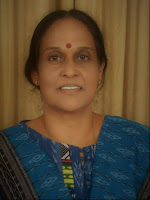An author and a fellowship
Veteran children's author and poet, Santhini Govindan, recently received a fellowship from the Government of India. In this interview she shares details about her fellowship and latest books.

1. This is the third time that you have been awarded a
fellowship. What makes a fellowship so appealing to you?
I was awarded my first fellowship (a
Junior Fellowship in Literature for two years) in August 1996 by the Department
of Culture, Ministry of Human Resource Development, Government of India, to
write historical fiction for
children in the short story form. I am greatly interested in history, so I
really enjoyed researching and writing these stories. The next fellowship I got
(a two year Senior Fellowship) was in 2002. This was for a completely different
subject. The fellowship was for a research project on ‘Children’s Literature in English in India – Its Growth and Development.’
The Lok Sabha Fellowship that I have just been awarded (in October 2018) is
a research fellowship to write a book introducing the Parliament of India to
the children of India. So, the work/subject for each fellowship is totally
different, and that makes it interesting.
2. Will you be based in Delhi to execute this project?
No, I will continue to work from Mumbai,
but will have to go to Delhi regularly for meetings to review the progress of
my project.
3. Will it be a fiction, or a non-fiction project?
The Lok Sabha Fellowship is for a research
project connected to the Indian Parliament. It is non-fiction.
4. Is there a word count for the book?
No word count has been specified.
5. Don’t you think two years is a generous timeline to execute
this project?
Most
of the people who get these fellowships have regular day jobs, so would require
this time to execute their research project. Also, each project will be
reviewed every quarter by officers of the Lok Sabha Secretariat (who also have
numerous other responsibilities apart from supervising these fellowships) and
they will need time to read all the reports that come in, and then suggest
changes that may need to be made.
6. The Parliament is a huge subject. What will be the
focus of this book?
This project is meant to write a book to
introduce children to the Parliament of India, and the work that it does that
has a specific bearing on their own lives. It is not meant to read like a
history book with events catalogued in chronological order.
7. There is no guarantee of publication in the stipulated
guidelines. Do you think the topic will appeal to trade publishers?
The
recipients of the fellowships have to try and get their books published once
their manuscript is written. Trade publishers and academic publishers might
accept the book manuscript if they think it is written in an engaging style
that will sell.
8. What is your latest CBT book about?
My
latest book published by CBT ‘The Magic of Curly Whorly’, won the first prize
in the category of ‘Get Ready for a Magical Time,’ in CBT’s XIX Competition for
Writers of Children’s Books. (2016). The story is about a little golden dragon
that emerges from a brown fingerprint that a little girl called Amira found smudging
her drawing sheet. My story is about the magical adventures of the dragon Curly–Whorly
(who hatched from the whorls of a fingerprint) and Amira, who is dyslexic.
9. Is your latest English Coach series a collection of stories?
The ‘English Coach,’
series (published by Blueprint Education for classes 1- 5) are academic course
books to teach English in schools. Each book has stories, poems, and plays
suitable for the target age group. The books contain some poems and stories from
the public domain, and also original poems and stories that I have written
myself to match the given themes (school life, friendship, protecting the
environment, Nature etc.) The stories/poems in each book are for a different age group, so the word count,
vocabulary and language are different for each book. I had to edit and rewrite parts of many of
the public domain stories too, to bring them to the required word count, and to make the language easily understandable to
young readers.




Comments
Post a Comment